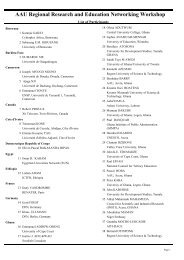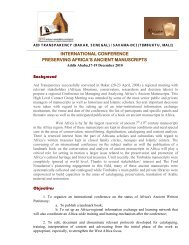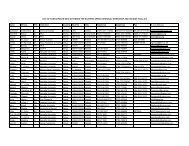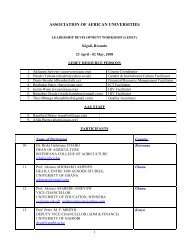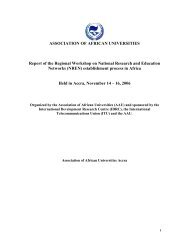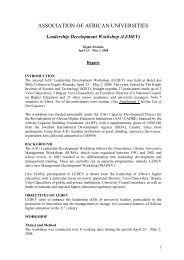strengthening higher education stakeholder relations in africa
strengthening higher education stakeholder relations in africa
strengthening higher education stakeholder relations in africa
You also want an ePaper? Increase the reach of your titles
YUMPU automatically turns print PDFs into web optimized ePapers that Google loves.
STRENGTHENING HIGHER EDUCATION<br />
STAKEHOLDER RELATIONS IN AFRICA<br />
GUIDELINES<br />
FOR THE CALL FOR LETTERS OF INTENT<br />
FOR CASE STUDY PARTNERSHIPS<br />
DEADLINE FOR SUBMISSION: Monday, October 25, 2010
Table of contents<br />
1. Program overview ........................................................................................1<br />
2. Case Study Partnership purpose..................................................................1<br />
3. F<strong>in</strong>d<strong>in</strong>g a partner..........................................................................................2<br />
4. Selection process ........................................................................................2<br />
5. Eligibility criteria ..........................................................................................2<br />
5.1 Eligible countries ...................................................................................2<br />
5.2 Institutional eligibility.............................................................................3<br />
5.3 Maximum number of Letter of Intent submissions per <strong>in</strong>stitution............3<br />
5.4 Required Canadian and African contributions .......................................3<br />
5.5 Presentation requirements ....................................................................4<br />
5.6 Deadl<strong>in</strong>e ................................................................................................4<br />
6. Selection criteria..........................................................................................4<br />
7. Partnership results and budget ....................................................................5<br />
7.1 Results...................................................................................................5<br />
7.2 Budget...................................................................................................5<br />
8. Timel<strong>in</strong>e .......................................................................................................7<br />
8.1 Workplan table.......................................................................................7<br />
8.2 Description of key activities ...................................................................7<br />
9. Letter of Intent application form ...................................................................9
1. Program overview<br />
The Association of Universities and Colleges of Canada (AUCC) has signed a $2 million<br />
agreement with the Canadian International Development Agency (CIDA) for a partnership with<br />
the Association of African Universities (AAU). This program will strengthen <strong>higher</strong> <strong>education</strong><br />
<strong>stakeholder</strong> <strong>relations</strong> <strong>in</strong> Africa and will focus on three key components:<br />
1) Strengthen<strong>in</strong>g African University Outreach – African universities <strong>in</strong> partnership with<br />
Canadian universities will strengthen their strategic plans for improved outreach to<br />
external <strong>stakeholder</strong>s;<br />
2) University-Industry L<strong>in</strong>kages – African universities <strong>in</strong> partnership with Canadian<br />
universities will produce case studies of successful African university-<strong>in</strong>dustry l<strong>in</strong>kages;<br />
and<br />
3) Strengthen<strong>in</strong>g AAU Stakeholder Relations – AAU will work <strong>in</strong> partnership with AUCC to<br />
strengthen its ability to support its member universities’ external <strong>stakeholder</strong> <strong>relations</strong><br />
and to strengthen its own external <strong>stakeholder</strong> <strong>relations</strong>.<br />
These guidel<strong>in</strong>es are for the Letter of Intent call for proposals for Component 2. Ultimately, 12<br />
Case Study Partnerships will be selected by an African-Canadian peer review committee. Letters<br />
of Intent must be submitted <strong>in</strong> either English or French. The 12 case studies chosen may or may<br />
not be with the same <strong>in</strong>stitutions as the <strong>in</strong>stitutions engaged <strong>in</strong> develop<strong>in</strong>g the 15 strategic plans<br />
through Component 1 (Strategic Plann<strong>in</strong>g Partnership) that was launched on May 31, 2010.<br />
If you have any questions regard<strong>in</strong>g this new program, <strong>in</strong> Canada, please contact Darlene Moll,<br />
Manager, Partnership Programs at AUCC, at dmoll@aucc.ca or (613) 563-3961 extension 305<br />
or, <strong>in</strong> Africa, please contact Ransford Bekoe, Assistant Project Officer, Office of the AAU<br />
Secretary-General, at ransford@aau.org or (233) 302 761588 or (233) 302 774495.<br />
2. Case Study Partnership purpose<br />
The Case Study Partnership component of the program will focus on two key outcomes. The first<br />
outcome will be the production of 12 case studies developed by African <strong>higher</strong> <strong>education</strong><br />
<strong>in</strong>stitutions <strong>in</strong> collaboration with Canadian experts on <strong>in</strong>dustry l<strong>in</strong>kages. The second outcome<br />
will be the selection of six model case studies from the 12 that were developed. The proponents<br />
of the six case studies will share lessons learned from the development of these case studies at a<br />
workshop where the six model case studies will be featured and subsequently dissem<strong>in</strong>ated to the<br />
broader AAU membership.<br />
These case studies will analyse the challenges and experiences from university-<strong>in</strong>dustry efforts<br />
and <strong>relations</strong>hips for the purposes of shar<strong>in</strong>g this experience with others <strong>in</strong> the African <strong>higher</strong><br />
<strong>education</strong> community. The 12 university-<strong>in</strong>dustry case studies selected will be awarded to<br />
<strong>in</strong>stitutions with pre-exist<strong>in</strong>g university-<strong>in</strong>dustry l<strong>in</strong>kages.<br />
The six model case studies will be exam<strong>in</strong>ed for lessons learned/best practices at a two-day<br />
workshop <strong>in</strong> Africa, with a particular attempt to surface key recurr<strong>in</strong>g university-<strong>in</strong>dustry<br />
<strong>relations</strong> themes <strong>in</strong> African <strong>higher</strong> <strong>education</strong> and their contributions to development. The<br />
purpose of the workshop is to collectively arrive at a comprehensive and deeper understand<strong>in</strong>g of<br />
Strengthen<strong>in</strong>g Higher Education Stakeholder Relations <strong>in</strong> Africa<br />
Guidel<strong>in</strong>es for Case Study Partnerships<br />
1
challenges and successes <strong>in</strong> university-<strong>in</strong>dustry <strong>relations</strong> which will <strong>in</strong>form the f<strong>in</strong>alization of the<br />
six model case studies. The workshop will take place <strong>in</strong> Africa and it will provide an opportunity<br />
for shar<strong>in</strong>g learn<strong>in</strong>g and experiences across the partnerships.<br />
To contribute to Canadian public engagement <strong>in</strong> <strong>in</strong>ternational development, case study partners<br />
are expected to organize at least one public engagement event when the African partners are <strong>in</strong><br />
Canada. More specifically, this <strong>higher</strong> <strong>education</strong> event will help to educate Canadians about<br />
African <strong>higher</strong> <strong>education</strong>’s contribution to development issues <strong>in</strong> their country.<br />
3. F<strong>in</strong>d<strong>in</strong>g a partner<br />
Some universities have already worked <strong>in</strong> an African-Canadian partnership and may be ready to<br />
approach a potential partner <strong>in</strong> order to propose a Letter of Intent. For those African and<br />
Canadian <strong>in</strong>stitutions that need assistance <strong>in</strong> f<strong>in</strong>d<strong>in</strong>g a partner, they are asked to submit<br />
notification of their <strong>in</strong>terest to their association (AAU or AUCC, respectively) no later than<br />
Monday, August 23, 2010. AAU members should submit such notification to AAU at<br />
ransford@aau.org. AUCC member <strong>in</strong>stitutions should submit their <strong>in</strong>terest <strong>in</strong> f<strong>in</strong>d<strong>in</strong>g an African<br />
partner to AUCC at rlalonde@aucc.ca. The AAU and AUCC will <strong>in</strong>form <strong>in</strong>terested parties about<br />
each other’s <strong>in</strong>terest so that they are free to explore form<strong>in</strong>g partnerships and f<strong>in</strong>d<strong>in</strong>g appropriate<br />
matches.<br />
4. Selection process<br />
The AAU and AUCC are responsible for review<strong>in</strong>g Letters of Intent submissions to ensure that<br />
all eligibility criteria are met before forward<strong>in</strong>g submissions to the Selection Committee.<br />
Submissions that do not meet all of the eligibility criteria will be <strong>in</strong>eligible. See the section on<br />
Eligibility criteria below.<br />
The Selection Committee will rank Letters of Intent by merit <strong>in</strong> terms of how well selection<br />
criteria are addressed. Scores and rank<strong>in</strong>gs will not be provided to proponents, but the<br />
Committee’s written and oral feedback will be provided to applicants, particularly as feedback<br />
perta<strong>in</strong>s to <strong>strengthen<strong>in</strong>g</strong> implementation.<br />
Nom<strong>in</strong>ations for Selection Committee membership were sought from AAU and AUCC member<br />
<strong>in</strong>stitutions. The Committee members serve as <strong>in</strong>dividual experts, not as representatives of their<br />
<strong>in</strong>stitutions. However, they will not score or participate <strong>in</strong> the discussions on submissions from<br />
their own <strong>in</strong>stitutions or where there is a conflict of <strong>in</strong>terest.<br />
5. Eligibility criteria<br />
5.1 Eligible countries<br />
Institutions from African countries that are both eligible for Canadian assistance and that are<br />
members of the AAU may apply. Institutions must be from one of the follow<strong>in</strong>g countries:<br />
Strengthen<strong>in</strong>g Higher Education Stakeholder Relations <strong>in</strong> Africa<br />
Guidel<strong>in</strong>es for the Call for Letters of Intent for Case Study Partnerships<br />
2
Algeria<br />
Angola<br />
Ben<strong>in</strong><br />
Botswana<br />
Burk<strong>in</strong>a Faso<br />
Burundi<br />
Cameroon<br />
Cape Verde<br />
Central African<br />
Republic<br />
Chad<br />
Comoros<br />
Congo,<br />
Democratic<br />
Republic of<br />
*CIDA focus countries<br />
Côte d'Ivoire<br />
Djibouti<br />
Egypt<br />
Equatorial Gu<strong>in</strong>ea<br />
Eritrea<br />
Ethiopia*<br />
Gabon<br />
Gambia<br />
Ghana*<br />
Gu<strong>in</strong>ea<br />
Gu<strong>in</strong>ea-Bissau<br />
Kenya<br />
Lesotho<br />
Liberia<br />
Strengthen<strong>in</strong>g Higher Education Stakeholder Relations <strong>in</strong> Africa<br />
Guidel<strong>in</strong>es for the Call for Letters of Intent for Case Study Partnerships<br />
Madagascar<br />
Malawi<br />
Mali*<br />
Mauritania<br />
Mauritius<br />
Morocco<br />
Mozambique*<br />
Namibia<br />
Niger<br />
Nigeria<br />
Rwanda<br />
Sao Tome and<br />
Pr<strong>in</strong>cipe<br />
Senegal*<br />
Seychelles<br />
Sierra Leone<br />
Somalia<br />
South Africa<br />
Sudan*<br />
Swaziland<br />
Tanzania*<br />
Togo<br />
Tunisia<br />
Uganda<br />
Zambia<br />
Zimbabwe<br />
At least 50 percent of partnerships selected will be for CIDA focus countries <strong>in</strong> Africa. See the<br />
Selection criteria section below. However, with<strong>in</strong> the maximum of 12 Case Study Partnerships<br />
that will be selected, there is no limit on how many of those partnerships may be <strong>in</strong> any one of<br />
the eligible countries, as long as those partnerships are for dist<strong>in</strong>ct African <strong>in</strong>stitutions.<br />
5.2 Institutional eligibility<br />
African and Canadian <strong>in</strong>stitutions must be members <strong>in</strong> good stand<strong>in</strong>g of the AAU or AUCC,<br />
respectively.<br />
5.3 Maximum number of Letter of Intent submissions per <strong>in</strong>stitution<br />
All Letters of Intent must be jo<strong>in</strong>t submissions that reflect a proposed partnership between<br />
African and Canadian universities. Canadian <strong>in</strong>stitutions, <strong>in</strong> conjunction with their African<br />
partner, may submit any number of Letters of Intent; however, a maximum of two per <strong>in</strong>stitution<br />
will be funded.<br />
5.4 Required Canadian and African contributions<br />
Both African and Canadian partner <strong>in</strong>stitutions are required to make a contribution of additional<br />
personnel time beyond the amounts funded by the CIDA contribution. See the Budget section for<br />
the required value of <strong>in</strong>-k<strong>in</strong>d time contribution. The number of days has been calculated based on<br />
estimated daily rates; however, partners need to ensure that the time contributed meets the<br />
required Canadian dollar value of the required <strong>in</strong>-k<strong>in</strong>d contribution consider<strong>in</strong>g actual salaries<br />
paid and henceforth to adjust the number of days accord<strong>in</strong>gly. Letters of Intent require that<br />
Canadian and African <strong>in</strong>stitutional authorities sign and attest to their support for the Letter of<br />
Intent, <strong>in</strong>clud<strong>in</strong>g the required <strong>in</strong>-k<strong>in</strong>d contributions.<br />
3
5.5 Presentation requirements<br />
Letters of Intent must be submitted <strong>in</strong> English or French, us<strong>in</strong>g the application form provided<br />
and respect<strong>in</strong>g all formatt<strong>in</strong>g/length <strong>in</strong>structions provided <strong>in</strong> that form. The completed Letter of<br />
Intent may not exceed eight pages, exclud<strong>in</strong>g the signature pages that must accompany the Letter<br />
of Intent.<br />
5.6 Deadl<strong>in</strong>e<br />
Letters of Intent, along with a signature page for each partner <strong>in</strong>stitution must be submitted<br />
electronically and simultaneously to AAU at ransford@aau.org and to AUCC at<br />
rlalonde@aucc.ca no later than 4 p.m. (UTC) for Africans and 12 p.m. noon (EDT) for<br />
Canadians on Monday, October 25, 2010.<br />
6. Selection criteria<br />
At least 50 percent of partnerships selected must be for <strong>in</strong>stitutions from CIDA focus countries <strong>in</strong><br />
Africa, namely: Ethiopia, Ghana, Mali, Mozambique, Senegal, Sudan or Tanzania. Letters of<br />
Intent will be assessed on the basis of the follow<strong>in</strong>g selection criteria:<br />
Relevance<br />
� Relevance to the African partner <strong>in</strong>stitution: The extent to which the proposed case<br />
study on university-<strong>in</strong>dustry <strong>relations</strong> <strong>in</strong> African <strong>higher</strong> <strong>education</strong> will br<strong>in</strong>g added value<br />
to the African partner <strong>in</strong>stitution and other <strong>higher</strong> <strong>education</strong> <strong>in</strong>stitutions once the case<br />
study is produced and distributed.<br />
� Relevance to Africa: The extent to which the case study is an appropriate example of<br />
university-<strong>in</strong>dustry l<strong>in</strong>kage <strong>in</strong> the African context and that the case study results could be<br />
transferable to other <strong>higher</strong> <strong>education</strong> <strong>in</strong>stitutions <strong>in</strong> Africa<br />
Partnership and expertise<br />
� African <strong>in</strong>stitution capacity to implement: Capacity of the African partner <strong>in</strong>stitution<br />
to implement the partnership, <strong>in</strong>clud<strong>in</strong>g the commitment and engagement of a director or<br />
manager of university-<strong>in</strong>dustry l<strong>in</strong>kages.<br />
� Canadian <strong>in</strong>stitution capacity to implement: Capacity of the Canadian partner<br />
<strong>in</strong>stitution to implement the partnership, <strong>in</strong>clud<strong>in</strong>g the commitment and engagement of a<br />
director or manager of university-<strong>in</strong>dustry l<strong>in</strong>kages.<br />
� Canadian expertise offered: Extent to which the Canadian <strong>in</strong>stitution offers access to<br />
their external <strong>stakeholder</strong> experience with<strong>in</strong> and beyond its <strong>in</strong>stitution, <strong>in</strong>clud<strong>in</strong>g <strong>in</strong>dustry<br />
liaison. If the Canadian partner is propos<strong>in</strong>g to support more than one Case Study<br />
Partnership, it must also make the case that it has the capacity to implement two<br />
partnerships.<br />
Methodology<br />
� Canadian public engagement: Strength of Canadian public engagement plan, namely,<br />
the strategies to raise awareness of and engage Canadian society <strong>in</strong> <strong>in</strong>ternational<br />
development through presentation(s) – or other approach(es) by African university<br />
representatives while they are <strong>in</strong> Canada.<br />
� Gender equality: Extent to which the proposed partnership will address gender equality.<br />
Strengthen<strong>in</strong>g Higher Education Stakeholder Relations <strong>in</strong> Africa<br />
Guidel<strong>in</strong>es for the Call for Letters of Intent for Case Study Partnerships<br />
4
� Environmental susta<strong>in</strong>ability: Extent to which the proposed partnership will address<br />
environmental susta<strong>in</strong>ability.<br />
� Budget: Extent of African and Canadian <strong>in</strong>-k<strong>in</strong>d contributions.<br />
� Approach: Why the case study was selected as an example of successful university<strong>in</strong>dustry<br />
l<strong>in</strong>kages.<br />
� Timel<strong>in</strong>e and duration: Extent to which the proposed case study was operational and<br />
was of a duration that was long enough to generate sufficient data to be analyzed.<br />
� Workshop participation: Will<strong>in</strong>gness of Canadian and African partners to participate <strong>in</strong><br />
the case study workshop to be held on April 25 and 26, 2012.<br />
7. Partnership results and budget<br />
7.1 Results<br />
The expected results of the Case Study Partnerships <strong>in</strong>clude:<br />
� a new case study with a clear focus on <strong>strengthen<strong>in</strong>g</strong> university-<strong>in</strong>dustry <strong>stakeholder</strong> <strong>relations</strong><br />
that demonstrate challenges and successes;<br />
� the AAU member <strong>in</strong>stitution’s leaders and managers will have a heightened understand<strong>in</strong>g of<br />
university-<strong>in</strong>dustry <strong>stakeholder</strong> <strong>relations</strong> by produc<strong>in</strong>g case studies; and<br />
� the Canadian university will have leaders and external <strong>relations</strong> managers with an <strong>in</strong>creased<br />
understand<strong>in</strong>g of university-<strong>in</strong>dustry <strong>stakeholder</strong> <strong>relations</strong> <strong>in</strong> the African context.<br />
These results, as well as required report<strong>in</strong>g, must be completed by July 15, 2012.<br />
7.2 Budget<br />
See the budget below for the Case Study Partnerships. It presents the maximum allowable<br />
contribution from CIDA and the m<strong>in</strong>imum required <strong>in</strong>-k<strong>in</strong>d contributions from Canadian and<br />
African universities.<br />
Strengthen<strong>in</strong>g Higher Education Stakeholder Relations <strong>in</strong> Africa<br />
Guidel<strong>in</strong>es for the Call for Letters of Intent for Case Study Partnerships<br />
5
DESCRIPTION<br />
OF COSTS<br />
African<br />
<strong>in</strong>stitution fee<br />
Canadian<br />
<strong>in</strong>stitution fee<br />
Travel and per<br />
diem for<br />
African to<br />
Canadian<br />
<strong>in</strong>stitution<br />
*Travel and<br />
per diem of<br />
Canadian to<br />
African<br />
<strong>in</strong>stitution<br />
*Travel and<br />
per diem of<br />
Canadian to<br />
workshop <strong>in</strong><br />
Africa<br />
*Travel and<br />
per diem of<br />
African to<br />
workshop <strong>in</strong><br />
Africa<br />
MAXIMUM<br />
CIDA<br />
COMMENTS ON CIDA<br />
CONTRIBUTION CONTRIBUTION<br />
$4,500 10 days @ $400 per day plus<br />
$500 for materials and<br />
ancillary expenses<br />
$5,000 Canadian <strong>in</strong>stitution hosts 1<br />
person from African <strong>in</strong>stitution<br />
for 2 weeks @ $2,500 per<br />
week: averaged at $500 a day<br />
for 10 work<strong>in</strong>g days of<br />
adm<strong>in</strong>istrators and faculty to<br />
contribute toward the time<br />
support<strong>in</strong>g the visit<strong>in</strong>g African<br />
$5,000 Travel and per diem for 1<br />
person from African <strong>in</strong>stitution<br />
to come to Canada @ $5,000<br />
per person<br />
$5,000 Travel and per diem for 1<br />
Canadian <strong>in</strong>stitutional<br />
representative to travel to<br />
African <strong>in</strong>stitution and to<br />
workshop<br />
$3500 Travel and per diem for 1<br />
Canadian <strong>in</strong>stitutional<br />
representative to travel to the<br />
workshop<br />
$3,500 Travel and per diem for 1<br />
African <strong>in</strong>stitution<br />
representatives @ $3,500 per<br />
person<br />
Strengthen<strong>in</strong>g Higher Education Stakeholder Relations <strong>in</strong> Africa<br />
Guidel<strong>in</strong>es for the Call for Letters of Intent for Case Study Partnerships<br />
CASE STUDY PARTNERSHIP BUDGET<br />
CANADIAN<br />
UNIVERSITY<br />
IN-KIND<br />
CONTRIBUTION<br />
COMMENTS ON CANADIAN<br />
UNIVERSITY<br />
IN-KIND CONTRIBUTION<br />
$12,000 Additional Canadian personnel<br />
time to support African<br />
participants <strong>in</strong> Canada: 15<br />
days @ $800 per day<br />
$8,000 Canadian personnel time to go<br />
to African <strong>in</strong>stitution:<br />
10 days @ $800 per day<br />
$4,000 Canadian personnel time to go<br />
to African <strong>in</strong>stitution and<br />
workshop: 5 days @ $800 per<br />
day<br />
AFRICAN<br />
UNIVERSITY<br />
IN-KIND<br />
CONTRIBUTION<br />
TOTAL $26,500 $24,000 $5,590<br />
COMMENTS ON<br />
AFRICAN UNIVERSITY<br />
IN-KIND<br />
CONTRIBUTION<br />
$4300 10 days of African senior<br />
personnel time @ $430 per<br />
day<br />
$1,290 3 days of African senior<br />
personnel time @ $430 per<br />
day for travel to and<br />
participation <strong>in</strong> workshop<br />
All figures are expressed <strong>in</strong> Canadian dollars. Time costs are estimated averages. Proponents must adjust time for actual costs to meet <strong>in</strong>-k<strong>in</strong>d requirements<br />
* Items are only allowable expenses if chosen as a model case study.<br />
6
8. Timel<strong>in</strong>e<br />
The workplan table below provides an overview of the timel<strong>in</strong>e for Case Study Partnerships. It is<br />
critical that the selected six model Case Study Partnership teams attend the workshop <strong>in</strong> Africa<br />
on April 25 and 26, 2012 and that all deliverables and report<strong>in</strong>g are completed and submitted by<br />
no later than July 15, 2012.<br />
8.1 Workplan table<br />
Strengthen<strong>in</strong>g Higher Education Stakeholder Relations <strong>in</strong> Africa<br />
Guidel<strong>in</strong>es for the Call for Letters of Intent for Case Study Partnerships<br />
Case Study Partnership Workplan<br />
Stakeholder <strong>relations</strong><br />
Case study activities Oct-Dec<br />
2010-2011 2011-2012<br />
12 African university case study missions to 12 Canadian<br />
<strong>in</strong>stitutions for 2 weeks sometime between March 1 and<br />
September 30, 2011 x x x<br />
One or more public engagement presentations <strong>in</strong> Canada by African<br />
university Case Study Partnership representatives timed to co<strong>in</strong>cide<br />
with African missions to Canada between March 1 and September<br />
30, 2011 x x x<br />
Draft case studies submitted by January 10, 2012. Six case studies<br />
chosen as model case studies by February 10, 2012 to be the<br />
focus of the April 2012 workshop x<br />
Six one-person Canadian university case study development and<br />
ref<strong>in</strong><strong>in</strong>g missions to 6 African universities timed to co<strong>in</strong>cide with the<br />
April 25 and 26, 2012 workshop<br />
Workshop <strong>in</strong> Africa focused on the six model case studies April 25<br />
and 26, 2012 x<br />
F<strong>in</strong>al case studies submitted to AAU and AUCC no later than July<br />
15, 2012<br />
8.2 Description of key activities<br />
Two-week work<strong>in</strong>g session <strong>in</strong> Canada<br />
One person from the African partner <strong>in</strong>stitution who is responsible for university-<strong>in</strong>dustry<br />
<strong>relations</strong> will travel to Canada for two weeks sometime between March 1 and September 30,<br />
2011. The aim is for the African partner to better understand the extent and nature of university<strong>in</strong>dustry<br />
<strong>relations</strong> <strong>in</strong> Canadian <strong>higher</strong> <strong>education</strong> <strong>in</strong>stitutions where there has been extensive<br />
development of university-<strong>in</strong>dustry <strong>relations</strong>hips over the past decades. While <strong>in</strong> Canada, the<br />
African university representatives will seek to understand the challenges and issues that arise out<br />
of university-<strong>in</strong>dustry <strong>relations</strong> <strong>in</strong> the Canadian context and to explore these issues <strong>in</strong> light of the<br />
African context.<br />
Jan-Mar<br />
Apr-June<br />
Jul-Sep<br />
Oct-Dec<br />
Jan-Mar<br />
7<br />
2012-<br />
2013<br />
Apr-June<br />
x<br />
x<br />
Jul-Sep<br />
x
To contribute to Canadian public engagement <strong>in</strong> <strong>in</strong>ternational development, case study partners<br />
are expected to organize at least one public engagement event when the African partners are <strong>in</strong><br />
Canada dur<strong>in</strong>g which time they will aim to educate Canadians about African <strong>higher</strong> <strong>education</strong>’s<br />
contribution to development issues <strong>in</strong> their country.<br />
Draft case study<br />
Each African representative, once back at their home <strong>in</strong>stitution, will develop a draft case study<br />
which will explore a particular success or challenge <strong>in</strong> their university-<strong>in</strong>dustry efforts that could<br />
serve as a model case study to be shared with the broader African university community. The<br />
Canadian partner will cont<strong>in</strong>ue to work remotely with the African partner on the development of<br />
the draft case study. The draft case studies will be submitted to AUCC and AAU no later than<br />
January 10, 2012. Six model case studies will be chosen by the Selection Committee and will<br />
be the focus of the April 2012 workshop <strong>in</strong> Africa. The same peer-review Selection Committee<br />
that selected the Case Study Partnerships will also select the six model case studies.<br />
Two-week work<strong>in</strong>g session <strong>in</strong> Africa<br />
Follow<strong>in</strong>g the selection of the six model case studies, one of the Canadian team members who is<br />
a university-<strong>in</strong>dustry l<strong>in</strong>kage expert will travel to Africa for a two-week mission around the<br />
April 25 and 26, 2012 workshop dates. The purpose of the mission will be to engage with the<br />
African partners to ref<strong>in</strong>e the case study. The Canadian university-<strong>in</strong>dustry l<strong>in</strong>kage expert will<br />
assist their African partner to further develop and strengthened the model case study that will be<br />
analysed at the workshop <strong>in</strong> Africa.<br />
Workshop <strong>in</strong> Africa<br />
The six model case studies will be exam<strong>in</strong>ed for lessons learned/best practices at a two-day<br />
workshop <strong>in</strong> Africa on April 25 and 26, 2012. The workshop will attempt to surface key<br />
recurr<strong>in</strong>g university-<strong>in</strong>dustry <strong>relations</strong> themes <strong>in</strong> African <strong>higher</strong> <strong>education</strong> and their contributions<br />
to development. The purpose of the workshop is to collectively arrive at a comprehensive and<br />
deeper understand<strong>in</strong>g of the challenges and successes <strong>in</strong> university-<strong>in</strong>dustry <strong>relations</strong> which will<br />
further <strong>in</strong>form the six model case studies and contribute to their <strong>strengthen<strong>in</strong>g</strong>.<br />
Workshop participants will <strong>in</strong>clude the African and Canadian partners from the six selected case<br />
studies, two Canadian or African university-<strong>in</strong>dustry experts (from academe, <strong>in</strong>dustry and<br />
possibly even government), as well as an African or Canadian curriculum development expert.<br />
The workshop will provide an opportunity for South-South capacity build<strong>in</strong>g.<br />
The workshop f<strong>in</strong>d<strong>in</strong>gs and lessons learned will be compiled by the AAU and AUCC <strong>in</strong>to a userfriendly<br />
report and practical guide. Also, the AAU and AUCC will use the workshop f<strong>in</strong>d<strong>in</strong>gs<br />
and lessons learned to develop a module for the AAU Management Development (MADEV)<br />
workshop series.<br />
Strengthen<strong>in</strong>g Higher Education Stakeholder Relations <strong>in</strong> Africa<br />
Guidel<strong>in</strong>es for the Call for Letters of Intent for Case Study Partnerships<br />
8
Production of case studies<br />
The workshop and dialogue on university-<strong>in</strong>dustry l<strong>in</strong>kages will help <strong>in</strong>form and further the<br />
development of the case studies. Follow<strong>in</strong>g the workshop, the Africans and Canadians will return<br />
to their home <strong>in</strong>stitutions and work remotely to more fully develop and f<strong>in</strong>alize their case study<br />
based on the workshop discussions. The deadl<strong>in</strong>e date for submission of f<strong>in</strong>al case studies is July<br />
15, 2012.<br />
9. Letter of Intent application form<br />
The Letter of Intent form, along with the required signature pages from the African and Canadian<br />
<strong>in</strong>stitutions, must be completed and submitted by email simultaneously to AAU at<br />
ransford@aau.org and to AUCC at rlalonde@aucc.ca no later than 4 p.m. (UTC) for Africans<br />
and 12 p.m. noon (EDT) for Canadians on Monday, October 25, 2010.<br />
Strengthen<strong>in</strong>g Higher Education Stakeholder Relations <strong>in</strong> Africa<br />
Guidel<strong>in</strong>es for the Call for Letters of Intent for Case Study Partnerships<br />
9



